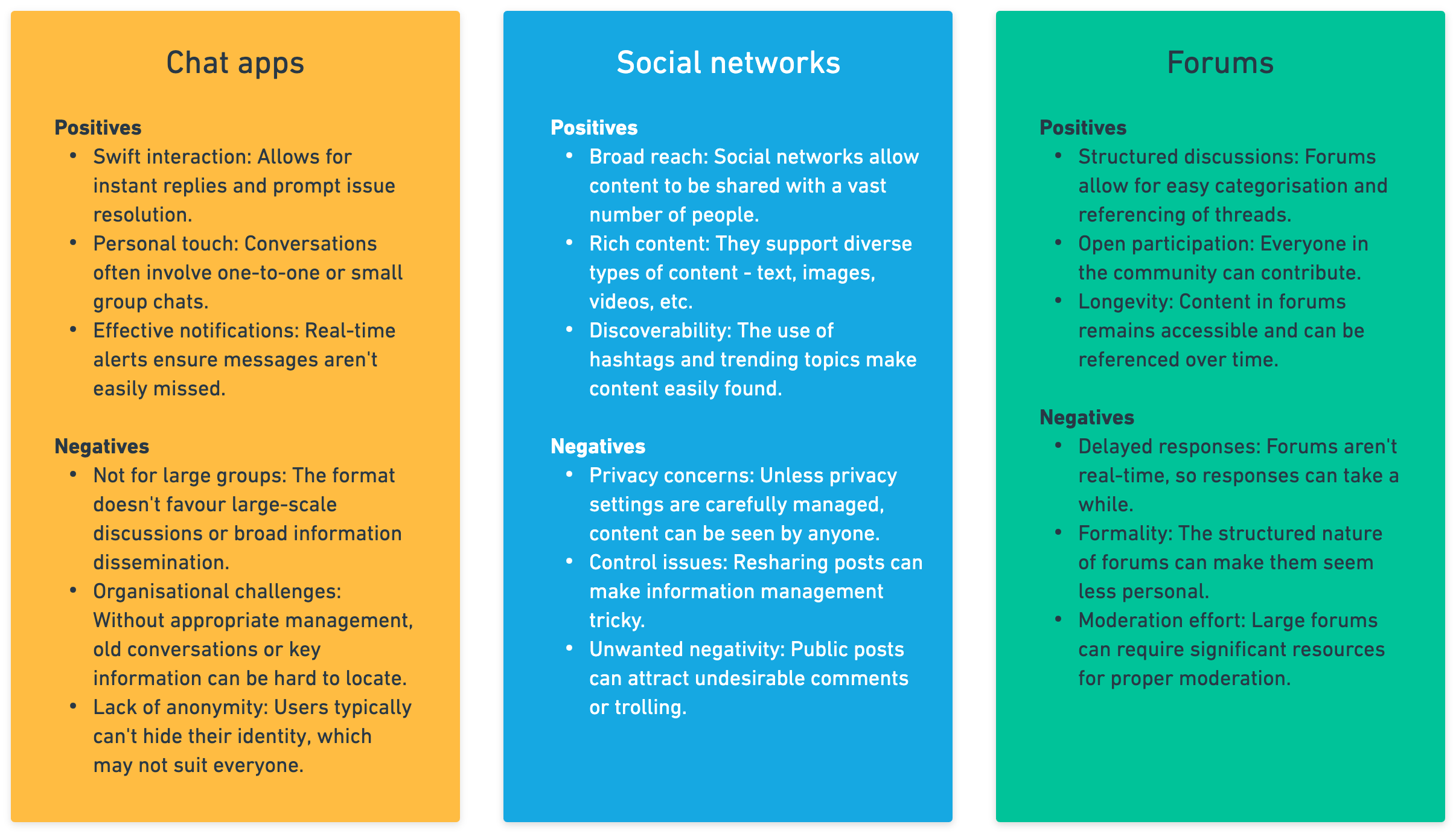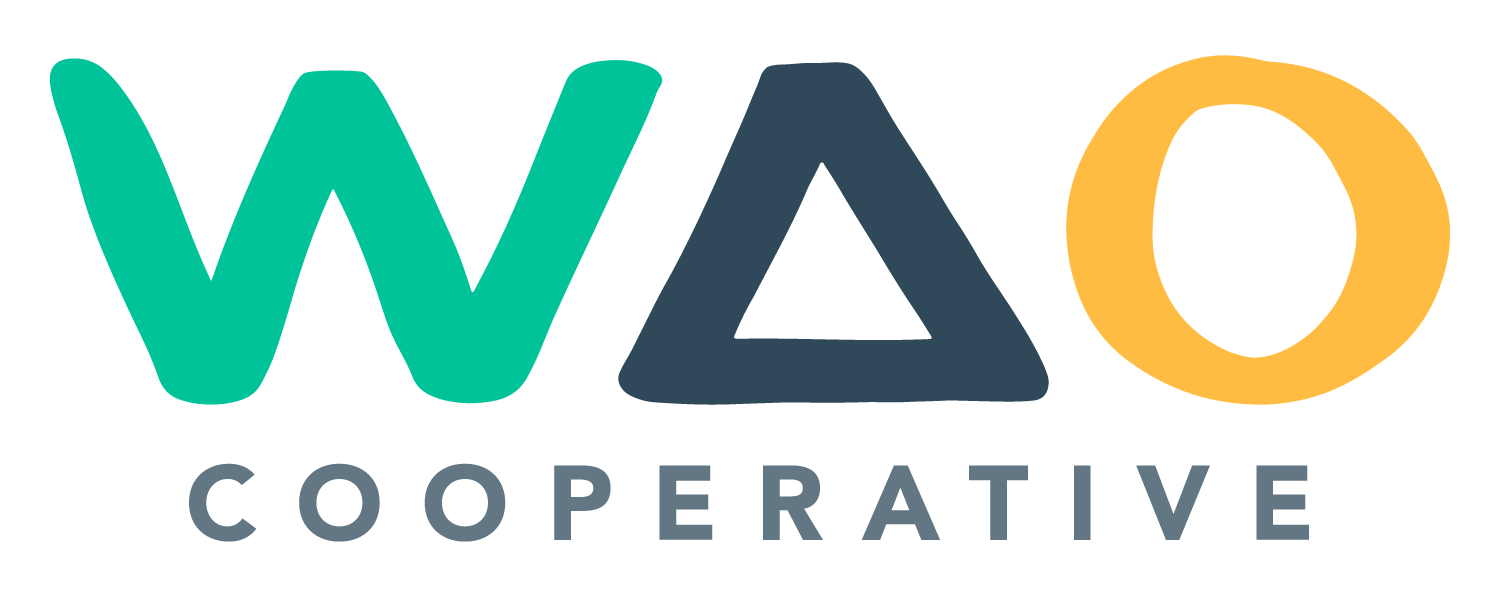
Online communities often spill out across multiple digital spaces. While there is usually a central hub towards which newbies are pointed, conversations can be found all over the place. These discussions could manifest themselves as hashtags, subreddit discussions, or even impromptu group chats at events.
Lately, we’ve been involved in a few conversations where we had to clarify the three primary modes of online community interaction: chat apps, social networks, and forums. We’ve realised that organisations sometimes expect these interactions to occur all in location. Although technically feasible, it’s not always the optimal solution.
Chat apps: swift and personalised interactions
Chat applications such as WhatsApp, Telegram, Signal, or professional platforms like Slack, Mattermost, and Microsoft Teams, lend a personal touch to digital conversations. Their strength lies in instant, small group and private chats. Real-time notifications ensure you won’t miss critical updates, but these platforms may falter when it comes to large-scale discussions. Older threads and crucial information can be difficult to find, and the lack of anonymity could deter some users.
Forums: structured, lasting discussions
Forum platforms like Discourse, phpBB, and Flarum offer a way to host structured discussions that are easily referenced. They welcome everyone in the community to participate and the content enjoys a longer lifespan. However, forums are not real-time, so responses may take time. They can feel more formal and less personal, and moderation could be a challenge for larger forums.
Social networks: broad reach and rich content
Social networks such as Twitter, Mastodon, and Instagram provide a plethora of engagement opportunities and ways of reaching new community members. Hashtags and trending topics enhance content discoverability. However, the visibility of content, unless privacy settings are managed effectively, can raise concerns. Controlling content spread can be tricky and public posts can sometimes attract unwanted negativity.
Our recommendation is not to silo these platforms but to be strategic in how to use them.
Define your community’s ‘home’: Is it a chat app for real-time interaction amongst a smaller group? Is it a forum to ensure structured, easily referenceable discussions? Or is it a Twitter hashtag for broader engagement?
Remember, overlaps are inevitable. For instance, Discourse, a forum software, has a real-time chat option, but it isn’t a ‘chat app’. There’s a platform called Hylo which we’ve tested with one client that feels like a social network but has the underlying structure of a forum. It’s essential to recognise your community’s primary hub, even if conversations overflow into other digital spaces.
To sum it up, each online space — whether it’s a chat app, a forum, or a social network — has its own benefits and drawbacks. It’s important to think about what you want from these spaces and use them in a way that works best for your community. A good way to start thinking about that is to use our Architecture of Participation approach.
We’re curious to hear your thoughts. Have you figured out where your community feels most at home online? How do you handle conversations that take place in different online spaces?
The following is the text from the image which accompanies this post.
Chat Apps
Positives
- Swift interaction: Allows for instant replies and prompt issue resolution.
- Personal touch: Conversations often involve one-to-one or small group chats.
- Effective notifications: Real-time alerts ensure messages aren’t easily missed.
Negatives
- Not for large groups: The format doesn’t favour large-scale discussions or broad information dissemination.
- Organisational challenge: Without appropriate management, old conversations or key information can be hard to locate.
- Lack of anonymity: Users typically can’t hide their identity, which may not suit everyone.
Forums
Positives
- Structured discussions: Forums allow for easy categorisation and referencing of threads.
- Open participation: Everyone in the community can contribute.
- Longevity: Content in forums remains accessible and can be referenced over time.
Negatives
- Delayed responses: Forums aren’t real-time, so responses can take a while.
- Formality: The structured nature of forums can make them seem less personal.
- Moderation effort: Large forums can require significant resources for proper moderation.
Social Networks
Positives
- Broad reach: Social networks allow content to be shared with a vast number of people.
- Rich content: They support diverse types of content — text, images, videos, etc.
- Discoverability: The use of hashtags and trending topics make content easily found.
Negatives
- Privacy concerns: Unless privacy settings are carefully managed, content can be seen by anyone.
- Control issues: Resharing posts can make information management tricky.
- Unwanted negativity: Public posts can attract undesirable comments or trolling.

Discussion